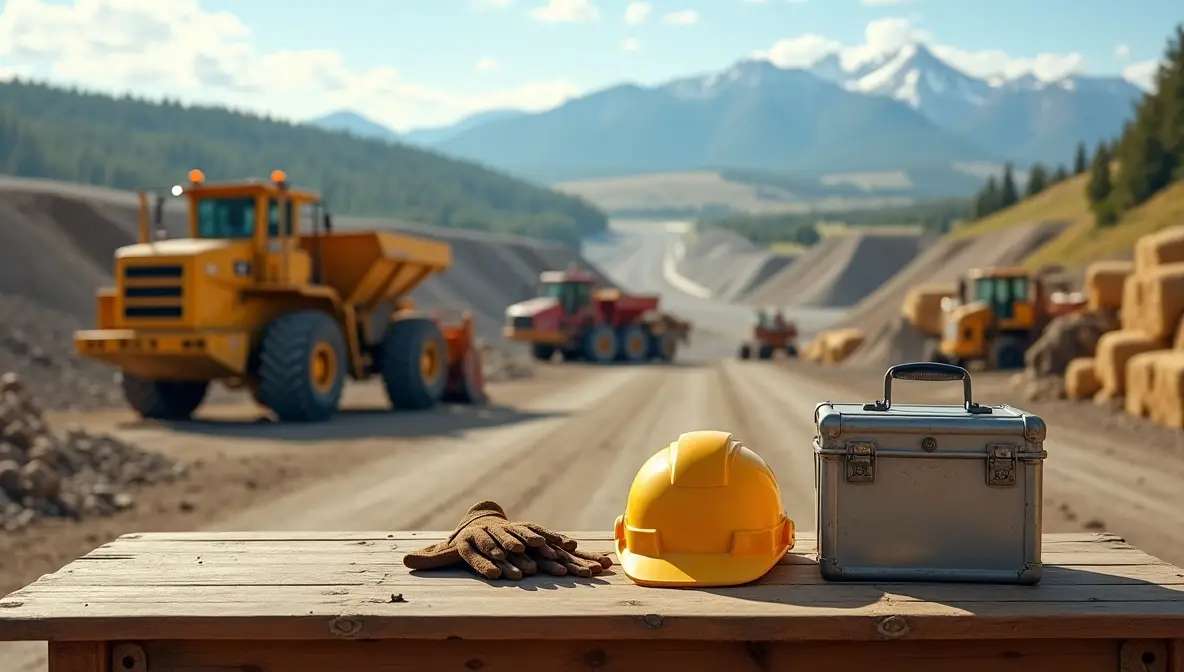Montana provides extensive employment opportunities for individuals with criminal records, particularly in mining, agriculture, and manufacturing sectors where skilled workers remain in high demand. The state's growing economy and industry-specific labor shortages create favorable conditions for second-chance hiring initiatives.
Key Takeaways
- Montana's mining industry actively recruits workers with criminal backgrounds for equipment operation, maintenance, and processing roles paying $45,000-$75,000 annually.
- Agricultural employers across the state prioritize work ethic and reliability over criminal history, offering seasonal and full-time positions.
- Manufacturing companies like Malmstrom Air Force Base contractors provide montana jobs for felons with comprehensive benefits packages.
- Construction and energy sectors experience significant labor shortages, creating opportunities for skilled workers regardless of criminal history.
- Transportation and logistics companies offer entry-level positions leading to commercial driving careers after background check clearance.
- Montana's "Ban the Box" policies for state employment help remove initial barriers for qualified candidates with criminal records.
Montana's Job Market for People with Criminal Records
Montana's economy presents unique advantages for job seekers with criminal records. First, the state's low population density creates labor shortages across multiple industries. This is particularly true in rural areas where employers prioritize skills over background checks. Meanwhile, Montana's strong agricultural and mining sectors traditionally focus on work performance rather than past mistakes.
Unemployment rates in Montana consistently remain below national averages. As a result, this creates competitive hiring conditions that benefit job seekers. This environment especially helps individuals seeking montana jobs for felons, as employers often overlook minor criminal histories when faced with staffing challenges. Furthermore, the state's emphasis on outdoor work and manual labor aligns well with many second-chance candidates' skill sets.
The state's economic diversity also provides multiple pathways to employment. For instance, seasonal work in agriculture can lead to permanent positions. Similarly, entry-level mining jobs often include training opportunities for career advancement. Additionally, Montana's growing technology and service sectors create new opportunities for skilled workers regardless of their background.
Mining Industry Opportunities for Felons
Montana's mining sector offers some of the most accessible montana jobs for felons in the state. Coal operations in southeastern Montana regularly hire individuals with criminal backgrounds for equipment operation roles. Similarly, copper mines near Butte focus on work performance rather than extensive background screenings. These positions typically require physical stamina and mechanical aptitude instead of perfect criminal records.
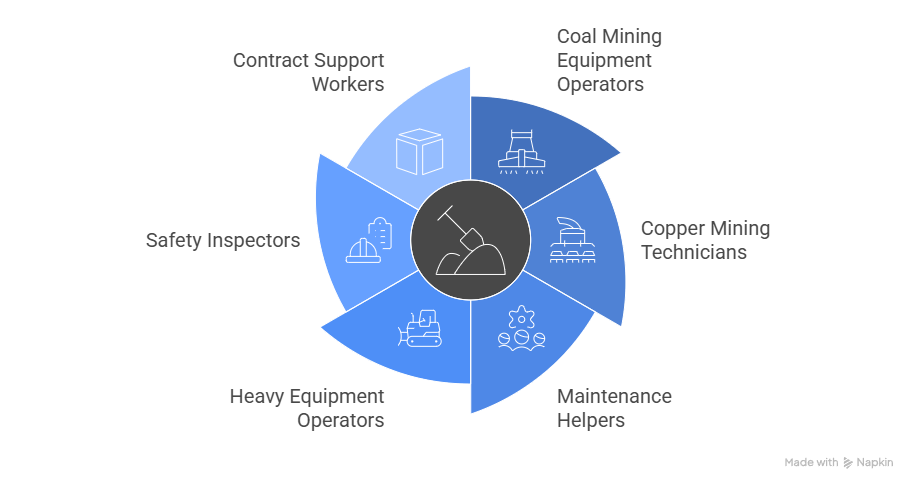
Major mining companies like Westmoreland Mining and Montana Resources prioritize safety records during their hiring processes. Additionally, they emphasize work performance over criminal history when evaluating candidates. Entry-level positions start around $18-22 per hour, while experienced operators earn $25-35 hourly. Most importantly, these companies provide comprehensive safety training, making roles accessible to career changers.
Coal and Copper Mining Positions
Coal mining operations offer immediate employment opportunities for second-chance job seekers. These positions involve operating heavy machinery, monitoring production systems, and maintaining equipment safety standards. Workers learn specialized skills through on-the-job training programs that lead to higher-paying positions.
Copper mining provides similar opportunities with additional technical training components. Equipment operators work with complex extraction systems while maintenance crews ensure operational safety. Furthermore, these roles often include overtime opportunities during peak production periods.
Support Services and Maintenance
Mining support roles create additional pathways into the industry for second-chance job seekers. Maintenance technicians work alongside mining teams without direct mineral extraction responsibilities. Equipment operators handle specialized machinery that requires detailed training. Safety inspectors ensure compliance with federal regulations while learning valuable technical skills.
These positions often require specialized training that employers provide on-site. However, workers gain transferable skills that apply to other industries. Contract companies serving mining operations frequently hire workers with flexible background requirements.
| Position Type | Starting Wage | Experience Required | Training Provided |
| Maintenance Helper | $16-19/hour | None | 2-week orientation |
| Equipment Operator | $20-26/hour | 6 months training | Ongoing certification |
| Safety Inspector | $22-28/hour | Industry certification | Company-sponsored |
These employers understand that reliable, hardworking individuals contribute more to operational success than pristine criminal records. Therefore, they focus hiring decisions on work ethic and safety awareness.
Agricultural Job Opportunities for People with Felony Convictions
Montana's vast agricultural landscape provides numerous montana jobs for felons across farming and ranching operations. The state's 28,000 farms and ranches consistently need seasonal and full-time workers for various tasks. These include crop production, livestock management, and equipment operation throughout the year. Rural employers typically prioritize work ethic and reliability over background checks, especially during peak seasons.
Seasonal agricultural work offers immediate employment opportunities with potential for permanent positions. Harvest seasons create urgent labor demands that benefit job seekers with criminal records. Similarly, calving periods require additional workers for livestock management. Planting times also generate temporary positions that can lead to full-time employment.
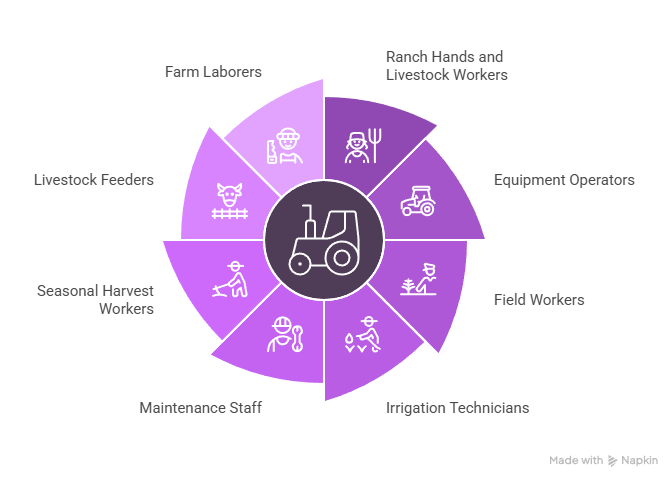
Many agricultural employers provide additional benefits beyond wages. For example, they often include housing, meals, and transportation in employment packages. This approach reduces financial barriers to employment while providing stability for workers. Additionally, rural locations offer peaceful environments that support personal rehabilitation and growth.
Livestock and Ranch Work
Cattle ranching dominates Montana's agricultural sector while creating diverse employment opportunities for second-chance job seekers. Ranch hands perform daily livestock care tasks including feeding, watering, and health monitoring. Livestock feeders work with specialized equipment to maintain nutrition programs. Equipment operators handle tractors, hay balers, and other machinery essential for ranch operations.
These positions require physical stamina and animal handling skills that employers teach through hands-on training. Most ranching operations value dependability and work ethic above background history. Ranch owners often develop long-term relationships with reliable workers, offering job security and skill development opportunities.
Ranch work typically involves several key responsibilities:
- Daily livestock care: Feeding, watering, and health monitoring of cattle, sheep, and horses across Montana's rangelands.
- Fence and facility maintenance: Repairing and building structures essential for livestock containment and safety.
- Equipment operation: Operating tractors, hay balers, and specialized ranch equipment requiring mechanical skills.
- Seasonal activities: Branding, shipping, and veterinary assistance during intensive work periods.
Workers often advance from general labor to specialized positions based on performance and reliability. Ranch foremen and livestock managers typically start in entry-level positions before developing leadership skills.
Crop Production and Farm Operations
Montana's grain and specialty crop farms provide montana jobs for felons during planting, growing, and harvest seasons. Wheat, barley, and pulse crop operations need equipment operators throughout the growing season. Field workers perform planting, cultivation, and harvest activities using both hand tools and machinery. Maintenance staff keep equipment operational while learning valuable mechanical skills.
These positions often lead to year-round employment with progressive farmers expanding their operations. Farm equipment operation requires technical skills that translate into valuable career development. Tractor operators learn complex machinery operation while contributing to essential food production. Combine drivers work during intensive harvest periods with opportunities for substantial overtime earnings.
Irrigation technicians manage water systems that ensure crop survival during Montana's dry seasons. These roles combine technical knowledge with problem-solving skills that transfer to other industries. Many farms provide equipment training and mechanical skills development as part of employment benefits.
Manufacturing and Industrial Employment Options
Montana's manufacturing sector provides stable employment opportunities for individuals with criminal backgrounds. Food processing facilities, aerospace component manufacturers, and wood product companies maintain large workforces throughout the year. These employers typically conduct basic background checks focused on recent criminal activity rather than comprehensive history reviews. Additionally, they often partner with workforce development programs serving second-chance job seekers.
Manufacturing environments offer structured work schedules with opportunities for overtime earnings. Workers develop technical skills while contributing to essential production processes. Safety training programs ensure workplace protection while building valuable certifications. Career advancement opportunities exist for dedicated employees who demonstrate reliability and skill development.
Food Processing Facilities
Montana's food processing industry offers stable montana jobs for felons with consistent year-round employment. Meat processing plants maintain large workforces for production line operations. Grain mills need workers for packaging, quality control, and equipment operation. Specialty food manufacturers hire individuals for diverse production tasks.
These facilities typically conduct basic background checks focused on recent criminal activity. However, they prioritize work ethic and reliability over minor criminal history issues. Production line workers start at $14-18 per hour for packaging, sorting, and quality control tasks. These positions require attention to detail and physical stamina but provide stable employment.
Machine operators earn $16-22 per hour operating specialized equipment with training provided by experienced supervisors. Maintenance technicians receive $20-28 per hour for mechanical repair and preventive maintenance duties. These roles require problem-solving skills and technical aptitude that workers develop through company training programs.
Food processing positions include several key areas:
- Production line work: Packaging, sorting, and quality control tasks requiring attention to detail and consistent performance.
- Machine operation: Running specialized equipment with comprehensive training provided by company supervisors and technical staff.
- Maintenance duties: Mechanical repair and preventive maintenance requiring problem-solving skills and technical knowledge development.
- Quality assurance: Testing and inspection processes ensuring product safety and regulatory compliance standards.
Safety certifications and food handling permits enhance employment prospects in this sector. Employers often pay for required training and certifications, making these positions accessible to motivated candidates.
Manufacturing and Assembly
Montana's growing manufacturing sector includes aerospace components, wood products, and machinery assembly operations. These facilities need assembly workers for diverse production environments. Quality inspectors ensure products meet specifications while learning technical skills. Packaging staff prepare finished goods for shipment while working in team environments.
Manufacturing employers frequently partner with workforce development programs serving individuals with criminal backgrounds. Assembly workers start at $15-20 per hour while learning specialized production techniques. Quality inspectors earn $17-23 per hour ensuring products meet customer specifications. Machine operators receive $19-25 per hour running complex production equipment.
| Industry Sector | Average Wage | Background Policy | Benefits Offered |
| Aerospace Assembly | $18-24/hour | Case-by-case review | Health insurance, retirement |
| Wood Products | $15-21/hour | Limited restrictions | Overtime opportunities |
| Machinery Manufacturing | $17-25/hour | Skills-based hiring | Skills training programs |
Manufacturing jobs provide career advancement opportunities through cross-training and supervisory development programs. Workers can progress from entry-level positions to lead roles within 2-3 years based on performance. Additionally, many companies offer tuition assistance for technical education and certification programs.
Transportation and Logistics Career Paths
Montana's transportation industry creates numerous montana jobs for felons across freight handling, warehouse operations, and local delivery services. The state's role as a transportation hub for agricultural and mining products generates consistent demand for logistics workers. Many transportation companies focus on driving records and work reliability rather than criminal background details. This approach creates opportunities for individuals committed to building professional careers.
Warehouse and distribution centers offer entry-level positions with advancement potential throughout the organization. Forklift operators handle materials movement while learning inventory management systems. Inventory clerks track products using computer systems and develop administrative skills. Shipping coordinators manage freight movement while building customer service experience.
These roles often provide health insurance and retirement benefits after probationary periods. Additionally, workers gain valuable skills in fast-paced environments that transfer to other industries. Career progression typically leads to supervisory positions and specialized logistics roles.
Warehouse and Distribution Operations
Distribution centers across Montana need reliable workers for order fulfillment, inventory management, and shipping operations. These facilities operate year-round with seasonal increases during agricultural harvest periods. Workers perform physical tasks while learning computerized inventory systems. Team environments provide supportive settings for skill development and career growth.
Warehouse positions start at $14-18 per hour for general labor and material handling duties. Forklift operators earn $16-21 per hour after completing safety certification programs. Inventory specialists receive $17-22 per hour managing computer-based tracking systems while developing administrative skills.
Commercial Driving Opportunities
Commercial driving careers become available to individuals with criminal records after meeting specific requirements. Local delivery routes provide work-life balance while building commercial driving experience. Construction hauling offers higher wages during peak building seasons. Agricultural transportation connects drivers with Montana's farming and ranching operations.
Most employers require clean driving records for the past 3-5 years and completion of commercial driver training programs. However, they often overlook non-driving related criminal history when evaluating candidates. Short-haul routes provide regular home time while building professional driving experience.
Construction companies need reliable drivers for daily operations and material delivery. Agricultural operations require seasonal drivers during planting and harvest periods. Local businesses hire drivers for delivery routes and customer service duties.
Commercial driving opportunities include:
- Local delivery routes: Providing work-life balance while building commercial driving experience and customer service skills.
- Construction hauling: Offering higher wages during peak building seasons with opportunities for overtime earnings.
- Agricultural transport: Connecting drivers with Montana's farming operations during seasonal peak periods requiring additional drivers.
- Regional freight: Providing overnight routes with higher earnings potential for experienced commercial drivers.
These positions typically pay $18-25 per hour with overtime opportunities during busy seasons. Companies often provide commercial driver training for promising candidates who meet basic requirements.
Construction and Skilled Trades Opportunities
Construction projects across Montana generate substantial employment opportunities for individuals with criminal backgrounds. The state's infrastructure development requires skilled workers for road construction, bridge repair, and utility installation. Residential construction provides opportunities in home building and renovation projects. Energy projects create specialized positions in wind, solar, and traditional energy development.
Construction employers traditionally focus on work performance and safety awareness rather than extensive background screening. Skilled trades apprenticeships provide pathways to high-paying careers through structured training programs. Electricians, plumbers, and HVAC technicians earn substantial wages after completing apprenticeship requirements. Many trade programs actively recruit second-chance candidates while providing supportive learning environments.
Union construction jobs often provide excellent benefits including health insurance, retirement plans, and skills training programs. Non-union contractors offer flexibility and immediate employment opportunities. Both environments provide career advancement based on skill development and work performance.
Residential and Commercial Construction
Building contractors across Montana need framers, roofers, and general laborers for ongoing construction projects. These positions offer immediate employment opportunities with potential for skills development. Construction work provides tangible results and job satisfaction that appeals to many second-chance job seekers. Additionally, workers develop valuable skills that transfer to other construction specialties.
Residential construction offers diverse opportunities for workers at different skill levels. Framing crews work with experienced carpenters to build home structures requiring physical strength and basic tool skills. Roofing teams install and repair roofing systems with safety training provided by established contractors. Finish work involves interior and exterior completion tasks requiring attention to detail.
Commercial construction projects provide longer-term employment stability with larger crews and extended timelines. These projects often include prevailing wage requirements, increasing earning potential for qualified workers. Workers gain experience with complex building systems while developing specialized construction skills.
Residential construction includes several key areas:
- Framing work: Building structural components requiring physical strength, basic carpentry skills, and safety awareness.
- Roofing installation: Installing various roofing materials with comprehensive safety training and equipment provided by contractors.
- Finish carpentry: Completing interior and exterior details requiring precision, attention to detail, and customer interaction skills.
- General labor: Supporting construction crews with material handling, site cleanup, and basic construction assistance.
Entry-level positions start at $15-19 per hour while experienced workers earn $22-28 hourly. Career advancement leads to crew leader and contractor positions for dedicated workers.
Skilled Trades Training
Apprenticeship programs in Montana provide structured pathways to high-paying skilled trades careers. Electrician programs combine classroom instruction with hands-on training under experienced professionals. Plumbing apprenticeships teach installation, repair, and maintenance skills while earning wages. HVAC training prepares workers for heating, ventilation, and air conditioning careers.
These programs typically last 3-4 years while providing steady wage increases based on skill development. Apprentices start at 50-60% of journeyman wages while learning trade skills. Graduates earn $25-35 per hour as journeymen with opportunities for self-employment.
Trade programs often partner with construction companies to provide guaranteed employment after completion. Additionally, they offer supportive environments for individuals rebuilding their careers. Financial aid and support services help apprentices succeed in demanding training programs.
Background Check Considerations for Montana Employment
Understanding Montana's background check processes helps job seekers prepare for employment applications effectively. Most employers conduct criminal background checks, but the scope and impact vary significantly between industries and individual companies. State and federal regulations guide background check procedures while protecting applicant rights. Additionally, Montana follows federal guidelines regarding background check timing and disclosure requirements.
The state's "Ban the Box" policies for government positions delay criminal history questions until later in the hiring process. However, private employers maintain flexibility in their background check procedures and timing. Some industries have specific regulations regarding criminal history restrictions for employment eligibility. Understanding these requirements helps job seekers target appropriate opportunities when searching for montana jobs for felons.
Successful applicants prepare thoroughly for background check discussions with potential employers. This includes obtaining personal background reports and preparing honest explanations for criminal history. Character references and documentation of rehabilitation efforts support employment applications effectively.
Industry-Specific Background Requirements
Different industries maintain varying standards for criminal background acceptance in montana jobs for felons. Healthcare, education, and financial services typically have stricter requirements due to regulatory compliance needs. These sectors often exclude candidates with specific types of convictions regardless of time elapsed. Conversely, construction, agriculture, and manufacturing often show greater flexibility regarding criminal history.
Transportation and logistics companies focus primarily on driving records rather than unrelated criminal offenses. Mining and energy companies emphasize safety records and work performance over minor criminal history. Food service and hospitality employers typically conduct basic background checks while prioritizing customer service skills.
Background check considerations vary significantly by industry sector:
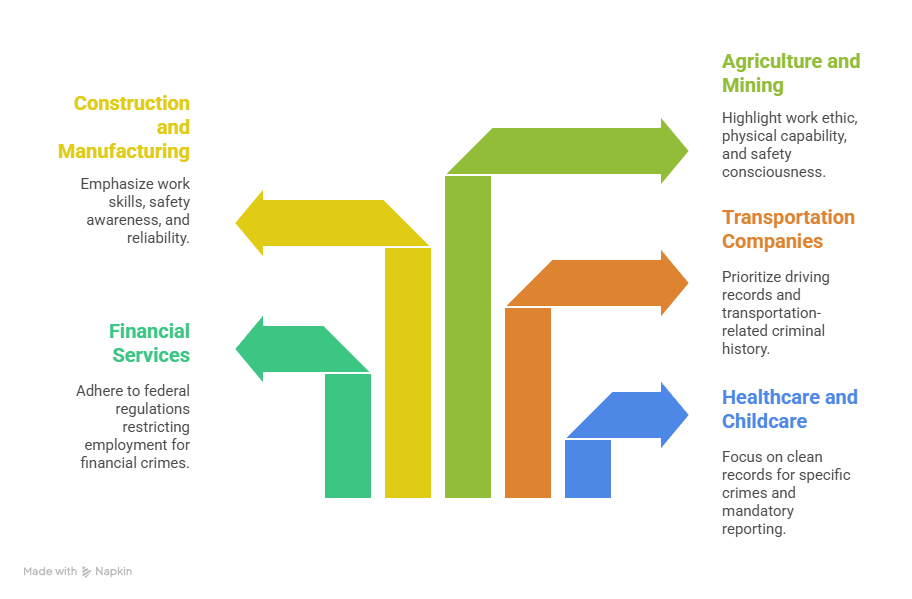
- Healthcare and childcare: Requiring clean records for specific crimes with mandatory reporting for certain positions and licensing requirements.
- Financial services: Following federal regulations restricting employment for individuals with financial crimes or recent felony convictions.
- Transportation companies: Focusing on driving records and transportation-related criminal history rather than unrelated minor offenses.
- Construction and manufacturing: Conducting basic checks while prioritizing work skills, safety awareness, and reliability over criminal history.
- Agriculture and mining: Emphasizing work ethic, physical capability, and safety consciousness over background check results.
Understanding these industry differences helps job seekers target appropriate employment opportunities and prepare for application processes.
Preparing for Background Checks
Successful job seekers with criminal records prepare thoroughly for background check processes and employer discussions. Obtaining personal background reports allows individuals to understand what employers will discover during screening processes. This preparation prevents surprises and enables honest discussions about criminal history. Additionally, preparing honest explanations demonstrates accountability and personal growth to potential employers.
Preparation strategies include gathering court documents, completion certificates from rehabilitation programs, and employment references demonstrating reliability. Character references from community members support employment applications effectively. Program coordinators and counselors often provide letters describing personal growth and rehabilitation efforts.
Most importantly, practicing honest discussions about criminal history builds confidence during interview processes. Employers appreciate direct communication about past mistakes and future goals. Focusing on skills, work ethic, and career objectives helps shift conversations toward positive employment potential.
Resources and Support Services for Job Seekers
Montana provides various support services for individuals seeking montana jobs for felons and career development opportunities. State workforce development programs offer job search assistance, skills training, and employment placement services. Nonprofit organizations provide comprehensive support including housing assistance and transportation help. Faith-based groups often maintain relationships with employers committed to second-chance hiring practices.
Reentry programs throughout Montana provide comprehensive support including job readiness training and professional development. Participants develop interview skills, workplace communication abilities, and professional networking connections. These programs help second-chance job seekers navigate employment challenges while building successful careers. Additionally, they often provide ongoing support after job placement to ensure employment stability.
Career counselors help individuals identify appropriate employment opportunities based on skills and interests. Job placement specialists connect qualified candidates with employers actively hiring individuals with criminal backgrounds. Skills assessment programs identify training needs and career development opportunities for participants.
Workforce Development Programs
Montana's workforce development system includes specialized services for individuals with criminal backgrounds. Career centers provide job search assistance, resume preparation, and interview training for second-chance job seekers. Computer labs offer access to online job applications and skills training programs. Career counselors help participants identify employment goals and develop action plans.
Skills training programs provide certification in high-demand occupations including healthcare, construction, and manufacturing. Participants learn technical skills while earning industry-recognized credentials that enhance employment prospects. Financial assistance often covers training costs, books, and supplies needed for program completion.
Job placement services connect qualified candidates with employers committed to second-chance hiring. Staff members develop relationships with human resources professionals who understand the value of hiring motivated individuals with criminal backgrounds. Follow-up services ensure employment stability and career advancement opportunities.
Community Support Organizations
Nonprofit organizations across Montana provide comprehensive reentry services including employment assistance, housing support, and life skills training. These organizations understand the unique challenges facing individuals with criminal backgrounds while offering practical solutions. Mentorship programs connect participants with successful community members who provide guidance and support.
Community organizations offer various services designed to support successful reintegration:
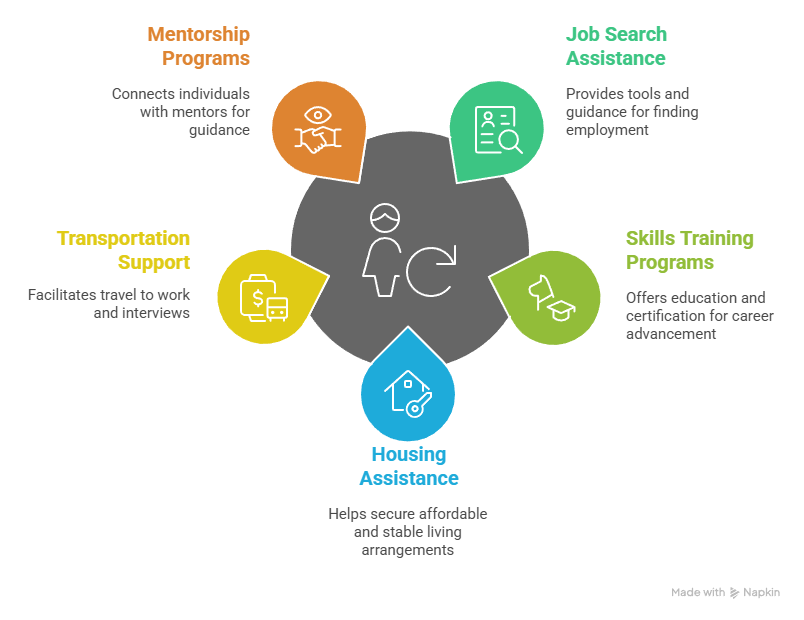
- Job search assistance: Resume writing, interview preparation, and job application support from experienced career counselors.
- Skills training programs: Technical training, certification programs, and educational opportunities leading to employment in growing industries.
- Housing assistance: Help finding affordable housing, transitional living programs, and rental assistance for qualified individuals.
- Transportation support: Bus passes, vehicle repair assistance, and carpooling programs helping individuals reach job interviews and work locations.
- Mentorship programs: Connecting participants with successful community members who provide guidance, support, and professional networking opportunities.
These organizations often maintain relationships with employers who actively hire individuals with criminal backgrounds, creating direct pathways to employment opportunities.
Conclusion
Montana's diverse economy offers substantial opportunities for individuals with criminal records across mining, agriculture, manufacturing, and construction sectors. The state's labor shortages and industry-specific hiring practices create favorable conditions for those seeking montana jobs for felons. Success requires strategic job searching, honest communication about criminal history, and commitment to workplace reliability and safety standards. With proper preparation and realistic expectations, individuals can build meaningful careers contributing to Montana's growing economy while achieving personal and professional rehabilitation goals.
Frequently Asked Questions
What types of Montana jobs for felons pay the highest wages?
Mining equipment operators and skilled trades positions typically offer the highest wages for individuals with criminal records, ranging from $45,000-$75,000 annually. Additionally, experienced agricultural equipment operators and construction supervisors earn competitive wages with advancement opportunities.
How long after a felony conviction can I find employment in Montana?
Most Montana employers consider candidates immediately after release, particularly in agriculture, construction, and manufacturing sectors. However, certain industries may require waiting periods of 5-7 years for specific types of convictions, while others focus more on recent criminal activity than historical records.
Do Montana employers conduct background checks for all positions?
Background check requirements vary significantly between employers and industries in Montana. While most employers conduct some form of screening, many agricultural and construction companies prioritize skills and work ethic over comprehensive criminal history reviews, especially for entry-level positions.
Are there specific programs to help felons find jobs in Montana?
Yes, Montana operates several reentry programs through the Department of Corrections and nonprofit organizations that provide job placement assistance, skills training, and employer connections. Additionally, workforce development centers throughout the state offer specialized services for individuals with criminal backgrounds.
Can I work in Montana's healthcare industry with a criminal record?
Healthcare employment depends on the specific conviction type and time elapsed since the offense. While direct patient care positions have stricter requirements, support roles like maintenance, food service, and administrative positions may be available with appropriate background clearance.
What should I disclose about my criminal history during job applications?
Honesty about criminal history is essential, but timing and presentation matter significantly. Focus on rehabilitation efforts, skills development, and employment goals while being prepared to discuss how past experiences contribute to your reliability and work ethic as an employee.
Additional Resources
- Montana Department of Labor & Industry Workforce Services
https://wsd.dli.mt.gov/ - Montana Second Chance Act Program
https://cor.mt.gov/Portals/104/Resources/SecondChanceAct.pdf - Goodwill Industries Job Training and Placement Services
https://www.goodwillmontana.org/ - Montana Legal Services Association Reentry Resources
https://www.montanalawhelp.org/ - Career Training Institute Workforce Development
https://www.careertraininginstitute.edu/ - Montana Mining Association Employment Opportunities
https://www.montanamining.org/
Still have questions?
Get in touch with our team today for a personalized demo and discover how our tailored volume pricing and packages can drive results for your business!
How useful was this page?*
Note: your comments are anonymous. We use them to improve the website. Do not include any personal details.
Visit our FCRA Compliance Tool or leave a message here if you need a response.
From the blog Explore the GCheck Content Hub

How Long Does a Background Check Take? A Complete 2025 Guide
13 Dec, 2023 • 14 min read
The Ultimate Background Check Guide
13 Dec, 2023 • 4 min read
The Ultimate Guide to Employment Background Checks
13 Dec, 2023 • 10 min readThe information provided in this article is for general informational and educational purposes only and should not be construed as legal advice or a substitute for consultation with qualified legal counsel. While we strive to ensure accuracy, employment screening laws and regulations—including but not limited to the Fair Credit Reporting Act (FCRA), Equal Employment Opportunity Commission (EEOC) guidelines, state and local ban-the-box laws, industry-specific requirements, and other applicable federal, state, and local statutes—are subject to frequent changes, varying interpretations, and jurisdiction-specific applications that may affect their implementation in your organization. Employers and screening decision-makers are solely responsible for ensuring their background check policies, procedures, and practices comply with all applicable laws and regulations relevant to their specific industry, location, and circumstances. We strongly recommend consulting with qualified employment law attorneys and compliance professionals before making hiring, tenant screening, or other decisions based on background check information.
